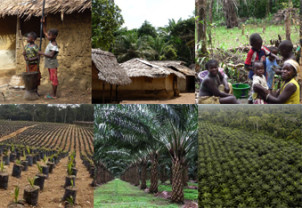
From the World Rainforest Movement
We, members of communities affected by industrial monoculture oil palm plantations, including peasant movements, as well as other civil society organizations from Africa, Europe, the Americas and Asia, and signatories to this declaration, met from 2 –5 November 2013 in Calabar, Cross River State, Nigeria,
Having:
– Shared testimonies and analyses related to the living conditions of rural communities affected by industrial oil palm monocultures;
– Shared experiences on monoculture oil palm and other types of monocultures implemented in all countries present at the meeting;
– Analyzed the consequences of the rapid and brutal expansion of monocultures promoted by multinational companies in different communities and countries;
– Analyzed the strategies and mechanisms for land grabbing and the invasion of multinational companies into different communities;
Having found that:
– Where multinational companies have engaged in implementing large-scale monocultures, they have left misery and poverty;
– Governments, on all continents, provide support to these companies, and many among them profit from the misery of their compatriots;
– Thousands of hectares of forest are destroyed every day to the benefit of monocultures, including oil palm;
– Communities are dispossessed of their land to the benefit of multinational corporations or speculative investors who manipulate governments, the police, or the entire judicial system of the countries they enter;
– Hundreds of people are imprisoned or killed every year for demanding their right to land, livelihoods and survival; and their lands, once transformed into monocultures, are militarized;
– Peasants are forced to work in slave conditions on their own land and buy food that once they produced;
– Voluntary initiatives and certification schemes such as RSPO (Roundtable on Sustainable Palm Oil) and REDD (Reducing Emissions from Deforestation and Forest Degradation) are inadequate to provide lasting solutions for the problems they claim to resolve;
– Conventions and legislation guaranteeing community rights are often violated by the different states in the slashing and grabbing of communities’ land;
Considering that:
– Monoculture tree plantations are not forests;
– Communities are not objects that can be moved or manipulated at will;
– Communities have the right to dignity and to raise their voice;
– The RSPO is not a mechanism to halt the massive expansion of monoculture oil palm plantations and the ever-increasing demand for palm oil to meet excessive consumption, including for agrofuels. Also REDD is not a mechanism to solve the impacts of climate change.
Reaffirm:
– Our support for all communities repressed by the policies of the powerful and to those who defend their land rights as indigenous peoples and peasant communities;
– Our commitment to demand that the governments of our countries ratify and respect the declarations and relevant international laws that protect the rights of communities and indigenous peoples;
– Our opposition to land and forest grabbing for monocultures and other projects including REDD;
– Our appeal to our governments to halt and control the expansion of large-scale monocultures, and to support community- based, including traditional, economic activities.
– Our determination to fight for food sovereignty and food security of communities;
– Our commitment to build alternative and appropriate solutions that go beyond mechanisms like RSPO and REDD;
– Our commitment to save the environment instead of having it transformed into hell on earth;
– Our commitment to be the voice of the voiceless wherever their voice needs to be heard;
– Our commitment to use all non-violent means necessary so that community rights are respected.
Adopted in Calabar, 5 November 2013
Signatures :
African Dignitiy Foundation- Nigeria
Boki Rainforest Conservation & Human Development Concern – Nigeria
Climate Cool Nigeria
Community Forest Watch Nigeria
RRDC-Nigeria
ERA/Friends of the Earth Nigeria
GREENCODE – Nigeria
JVE – Ivory Coast
Brainforest-Gabon
Green Scenery-Sierra Leone
SDI-Liberia
FCI -Liberia
GRABE- Benin
COPACO – DRC and La Via Campesina Africa
FERN-UK
Green Development Advocates – Cameroon
Struggle to Economize Future Environment-SEFE – Cameroon
WALHI-Indonesia
SPI-Indonesia
GRAIN
WRM

The project ENVJUSTICE has received funding from the European Research Council (ERC) under the European Union’s Horizon 2020 research and innovation programme (grant agreement No. 695446)